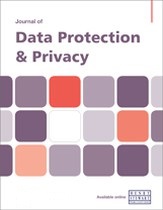Exploring the privacy paradox among social media users in the United States
Abstract
Realising that voluntary compliance with online privacy disclosure increases access to consumer data, there is a need for marketers to better understand the key factors that contribute to the social media user’s tipping point — the point where a consumer would voluntarily adopt more stringent online privacy protocols or reduce engagement in social media. Adopting the theoretical framework of the protection motivation theory, this research tested existing cognitive measures (internet self-efficacy, content credibility, impression management and satisfaction with life) to determine if the measures mitigated or exacerbated social media users’ privacy concerns. The notion that personality correspondingly contributed to the personal assessment of privacy concerns was also tested. An online survey was fielded among 433 US participants. Observed variable multiple regressions were utilised to analyse the net effects of each variable on privacy concerns. The results of this study strongly suggest that there are user characteristics that align with the inclination to be concerned about privacy issues. Specifically, social media users who are sceptical regarding social media content and confident in their own abilities to protect their online data are likely to be more concerned about data privacy. The current research suggests that privacy concerns are attributable to rational concerns, which could include factors such as compensatory exchanges with advertisers and the amount of value placed on convenience and access over security. Implications for practitioners are provided.
The full article is available to subscribers to the journal.
Author's Biography
Kelty Logan is a member of the Department of Advertising, Public Relations and Media Design faculty at the University of Colorado Boulder. She has more than 20 years of experience as a marketing executive in the advertising, broadcast network and product marketing industries. She has worked for multinational advertising agencies in New York and Europe, managed programme promotion for NBC and directed brand management for Mars, Inc. As an academic, Kelty focuses on the challenges of the new media environment. In particular, she is fascinated by the changing patterns of media usage resulting from digital technology and its impact on the advertising industry. Her work has been published in the Journal of Marketing Communication, Journal of Advertising Research and Journal of Interactive Advertising, among others. She received her BA in history from the University of California, Los Angeles, an MBA from Tulane University and a PhD in advertising from The University of Texas at Austin.
Laura F. Bright is an Associate Professor of Media Analytics at the Stan Richards School of Advertising & Public Relations. Her research focuses on social media addiction and fatigue, Big Data and analytics, personalised advertising and digital privacy, and her work has been published in numerous peer-reviewed journals. She has spent over a decade working in the interactive advertising business and supports various companies and organisations to optimise their digital presence.
Harsha Gangadharbatla is a member of the Department of Advertising, Public Relations and Media Design faculty at the University of Colorado Boulder. Prior to his academic career, he was an electrical engineer and worked for Cognizant Technology Solutions as a programmer, writing code in assembly language and COBOL on legacy systems. At the University of Colorado Boulder, he served as the founding chair of the Advertising, Public Relations and Media Design department. Harsha’s research interests lie at the intersection of technology, business and communication. He has authored (or coauthored) over 40 publications, including conference proceedings. His work has appeared in the Journal of Advertising, Journal of Business Ethics and International Journal of Advertising, among others. He is a former associate editor of the Journal of Interactive Advertising. He holds a BE in electrical engineering from MNNIT (India), an MA in advertising from Michigan State University and a PhD in advertising from The University of Texas at Austin.
